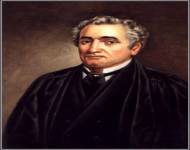Early Life
John Catron was born on January 7, 1786 in Wythe County, Virginia. Catron lived in Kentucky and Tennessee as a child, though little information is known of his upbringing.
Catron served in the War of 1812 under Andrew Jackson. Following the war, Catron studied law and was admitted to the bar in Tennessee in 1815. The same year, he began a private practice in Sparta, Tennessee, while also serving as the prosecuting attorney for the city. In 1818 Catron moved to Nashville, where he established a land law practice.
Early Career
In 1824 Catron was appointed to the Tennessee Supreme Court of Errors and Appeals. Seven years later in 1831 he was elevated to Chief Justice of that court, where he served for another three years. After the position of Chief Justice was abolished, Catron moved back to Nashville to resume his private practice.
During the Presidential Election of 1836 Catron led Martin Van Buren’s campaign throughout the state of Tennessee. In doing so, Catron gained renowned for his support of Jacksonian Democracy.
Supreme Court
In 1836, Congress expanded the number of positions on the United States Supreme Court from seven to nine members. Just before leaving office, President Andrew Jackson appointed Catron to fill a newly established seat on the Court. John Catron officially began his post on March 8, 1837.
During his tenure on the Supreme Court, Justice Catron became known for his support of slavery. In the landmark Dred Scott v. Sandford (1857) hearing, Catron wrote a separate opinion supporting the majority opinion that the slave, Scott, remained a slave despite being taken into a free territory. He concurred with the majority that Congress had no power to interfere with slavery in the western territories.
Although Justice Catron served on the Supreme Court for nearly three decades, he made very few court decisions and generally voted in line with Chief Justice Roger Taney.
In the early 1960’s, Justice Catron voiced his opposition against succession, despite its support from his home state of Tennessee. In doing so, Catron was forced to relocate to Kentucky during the Civil War when he refused to support the confederacy.
Death
Justice Catron served on the Supreme Court until his death on May 30, 1865 at the age of 79.
Notable Cases:
Dred Scott v. Sandford (1857)








